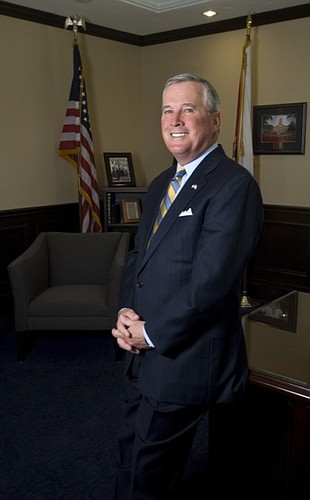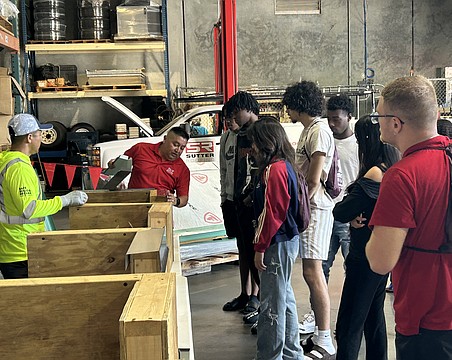Garrett Richter built and sold one of the most successful banking franchises on the Gulf Coast.
Now, he's aiming to repeat.
Richter and partners Gary Tice, C.C. Coghill and Robert Reichert sold Naples-based First National Bank of Florida at the peak of the market in 2005 to Fifth Third Bank for nearly $1.6 billion, or 5.75 times tangible book value. They had started the bank with just $7.5 million in 1989 and turned it into a $5.5 billion franchise with 77 branches from Tampa to Orlando, Sarasota, Fort Myers and Naples.
Their new bank, First National Bank of the Gulf Coast, opened in October 2009 with $32 million in capital and recently won a commitment of $148 million from two investor groups. Donald Marron, the former chairman and CEO of Paine Webber, heads one of these groups, Lightyear Capital.
Richter's insights in banking have served him well as a Republican state senator from Naples. He's now the chairman of the senate committee on banking and insurance.
Q: What are community banks' most pressing challenges?
A: Two issues: capital and time. A lot of the capital markets have dried up. It's much more difficult to raise capital, so if a bank wants to survive and change their capital ratios, one of the most positive ways for them to do that is to sell or merge with a bank that has a strong capital position. Banks are going to need enough capital to establish a large enough base, a large enough balance sheet to deal with the overwhelming regulatory environment.
Q: So what is the future of smaller community banks in that regulatory environment? Do they have to reach a certain size to survive?
A: A smaller community bank is going to have a really, really difficult time meeting regulatory demands and at the same time meeting the shareholder demands. So in order to be able to meet your shareholder demands, your regulatory demands, the community demands, I believe banks are going to have to grow to $1 billion in assets. Our goal is to be $3 billion.
Q: But only a handful of banks headquartered on the Gulf Coast currently have $1 billion or more in assets. What happens to everybody else?
A: I think there will be strategic partners. Some banks will be shut down. Some banks will be acquired.
Q: So are there more out-of-state banks poised to come into this market?
A: We've got most of the major players in the state now. What is attractive about Florida is that we have a leader in the state, Gov. Rick Scott, who is more concerned with jobs than with poll ratings. He's a jobs-focused governor. He wants to create a business-friendly environment in Florida.
Q: Are private-equity funds in the market for banks in Florida?
A: In my opinion, I think presently it's run its course. I don't know if that market will open back up again. The private equity market is not static. There are a lot of things that influence it, such as the Euro zone. What's going on in Italy and Greece and Portugal impact those equity markets. So right now, it's my opinion that they're not out of the park but they're on the bench.
Q: So who will drive acquisitions in Florida?
A: It can be peer-to-peer. We're out looking to do acquisitions right now, initially in the three-county area of Lee, Collier and Charlotte. Then, as soon as we can identify opportunities and we're profitable, we'll continue to expand toward Tampa and over into Orlando. The buyers will come in many different shapes and forms. There will be banks like us and then there will be the large megabank acquisitions that will try to grow their marketplace exposure.
Q: Are we going to see more FDIC bank closures?
A: I believe so. If you diagnose it, what causes a bank to fail today? It's primarily a deterioration of their assets and a decline of their capital. Those two are connected. The reason their capital goes down is that they have to pay down their bad assets. Now, there is proposed legislation in Congress that would give some relief to the burdensome regulations, getting rid of stipulations that defy common sense. For example, forcing banks to reappraise and write down assets that are paying and current.
Q: Where do you see bank valuations?
A: In the acquisition market, they are below book value in Southwest Florida. One of the things that drive bank valuations is earnings. That's why some banks are looking to form strategic partnerships. They need to consider a less-than-book multiple in order to create a base or a size strong enough to be able to earn through the regulatory costs and develop more earnings, which will raise book value.
Q: What do you mean by strategic partnerships?
A: I would define it as two banks coming together, whether it's an acquisition or merger. The resulting entity is bigger, stronger and still reliant on the two senior management teams to grow the bank in their respective communities. That's different from a pure acquisition, where a megabank comes in and buys a bank and to get their synergies they let the rainmakers and the senior people go.
Q: What is your own bank's growth strategy?
A: We have a three-pronged growth strategy. We want to grow the bank organically. We want to grow the bank through whole-bank acquisitions. And we want to grow the bank, if the opportunity presents itself, through failed bank transactions through the FDIC, in that order. When you buy a failed bank, those assets tend to run off pretty quickly, so you'd better have a good organic growth program in place to replace those assets. We will never take our eye off the organic-growth opportunities. We have an experienced Floridian management team. We're not from out of state and we're going back into the markets we previously served successfully.
Q: Are there some geographic areas you're keen on?
A: Right now it's Collier, Lee and Charlotte, with a loan-production office in the Tampa-St. Pete area. Once we achieve some profit goals, we will expand our acquisition energies up the west coast to Tampa and then over into Orlando, which is our former footprint.
Q: So you can now buy banks at a reasonable price?
A: That will always be a challenge with an acquisition strategy, especially with community banks. You can buy the same car off a car lot or from an individual. When you try to buy the same car from an individual, they typically want more for it because they're emotionally attached. It's the same thing with community banks. The local board of directors and management teams end up being a little more emotionally attached because it's their baby. So there has to be some realism drawn to what the prices are.
Q: Is that realism happening?
A: It is happening for those board members who are visionary, those board members who can get past the emotions and address the reality of the marketplace. It's happening for those board members who say, “you know what? We're not going to reach into our pockets for more capital.” The board members have got to be visionary; they have to face the reality.
Q: When you speak with business owners, you hear the refrain that banks aren't lending. What's the outlook for lending and are banks loosening their requirements?
A: The comment that banks aren't lending is like saying restaurants aren't selling food. Banks are lending. The challenge is finding loans that meet the lending criteria. Right now, cash flow is a critical component of the credit-approval process. Cash flow trumps collateral. It trumps character. And it trumps credit.
Q: What are your customers saying about the economy? Will it take an election to change things?
A: I think there are a lot of businesses that are lining up at the starting line. I think there are a lot of businesses ready to start the run again. There are probably some people who are going to be taking a look at the national election results. The national election results will have a dramatic impact on the nation's economy. Said differently, we need a change in leadership.
Q: So what can the state do to help community banks?
A: Community banks become beneficiaries of expansive growth from a business environment. Businesses that relocate to Florida will be looking to do real estate acquisitions, building acquisitions and invest capital in the state. As the governor reduces regulations and makes it easier for permitting, it creates an environment where existing companies can find it easier to expand and out-of-state companies can find it easier to relocate to Florida.






